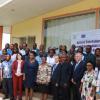News
Displaying Results 26 - 38 of 38
The raw materials sector is at the forefront of global challenges and opportunities of the 21st century, as it plays a vital role in the energy, transport, and digital transitions required to mitigate and adapt to climate change. However, the sector also faces significant pressures from consumers,…
The impact of different air pollutants on vegetation and crops has been studied for over 35 years in the framework of the UNECE Convention on Long-range Transboundary Air Pollution, through its International Cooperative Programme on Effects of Air Pollution on Natural Vegetation and Crops (ICP…
Would you trust artificial intelligence (AI) in your heart? This is not some imaginary, science-fiction scenario. Biomedical companies are already developing pacemakers embedded with AI. Digital technologies like AI are also opening new possibilities such as improved management of natural resources…
Sierra Leone shares four major rivers with the neighbouring countries of Guinea and Liberia, including the Great Scarcies, Little Scarcies and Moa shared with Guinea, and Mano River shared with Liberia. All provide crucial freshwater that sustains ecosystems, livelihoods and the well-being of…
At the World Economic Forum Annual Meeting in Davos, UNECE Executive Secretary Tatiana Molcean highlighted the role of UNECE’s legal instruments, standards and tools in dealing with the most pressing global challenges, namely climate change, digital and green transformations, low-carbon energy…
Burkina Faso is one of the Sahelian countries hardest hit by the effects of climate change, experiencing torrential rains and floods, as well as periods of insufficient rainfall.
To help address these challenges, through adaptation, resilience and concerted, shared management of its water…
Originally introduced in policy and development discussions in 2011, the water-food-energy-ecosystem nexus approach has evolved into a pivotal framework for sustainable development and achieving the Sustainable Development Goals (SDGs).
Work on the water-energy-food-ecosystems nexus under the…
Trade facilitation is a potent instrument that can multiply the benefits of trade. Beyond direct impact on economic growth through higher trade flows linked to improved efficiency at the borders, trade facilitation reforms can also contribute to other policy goals. For example, through the…
Cooperation and management of transboundary waters, which span over 45% of the world's surface and serve as vital resources for nearly half of the global population, face the imminent threat of underfunding. The last reporting exercise on Sustainable Development Goals (SDG) indicator 6.5.2 (2020),…
According to a recently published UNECE Policy Paper, the agrifood, the garment and footwear and the mineral sectors contribute significantly to the economic growth and employment in the UNECE region, while being major sources of global greenhouse gases (GHG) and environmental pollution. Evidence…
The European Commission has proposed a new legislation, the European Critical Raw Materials Act, to ensure a secure and sustainable supply of critical raw materials for the EU. The Act, on which the European Parliament and the European Council reached a provisional agreement on 13 November,…
Risk is a part of our everyday lives. When we wear a helmet to ride a bike, for example, we accept a small inconvenience to reduce the risk of a fall or an accident. When a homeowner decides to retrofit their house, they incur a cost to shield against an earthquake or a flood. Faced with the COVID…
Every year we lose about 14% of the food produced before it is sold, and this does not even include the food never harvested. Even more is wasted at retail and consumer levels. At the same time, over 800 million people worldwide suffer from hunger, while food loss is a major contributor to CO2…












